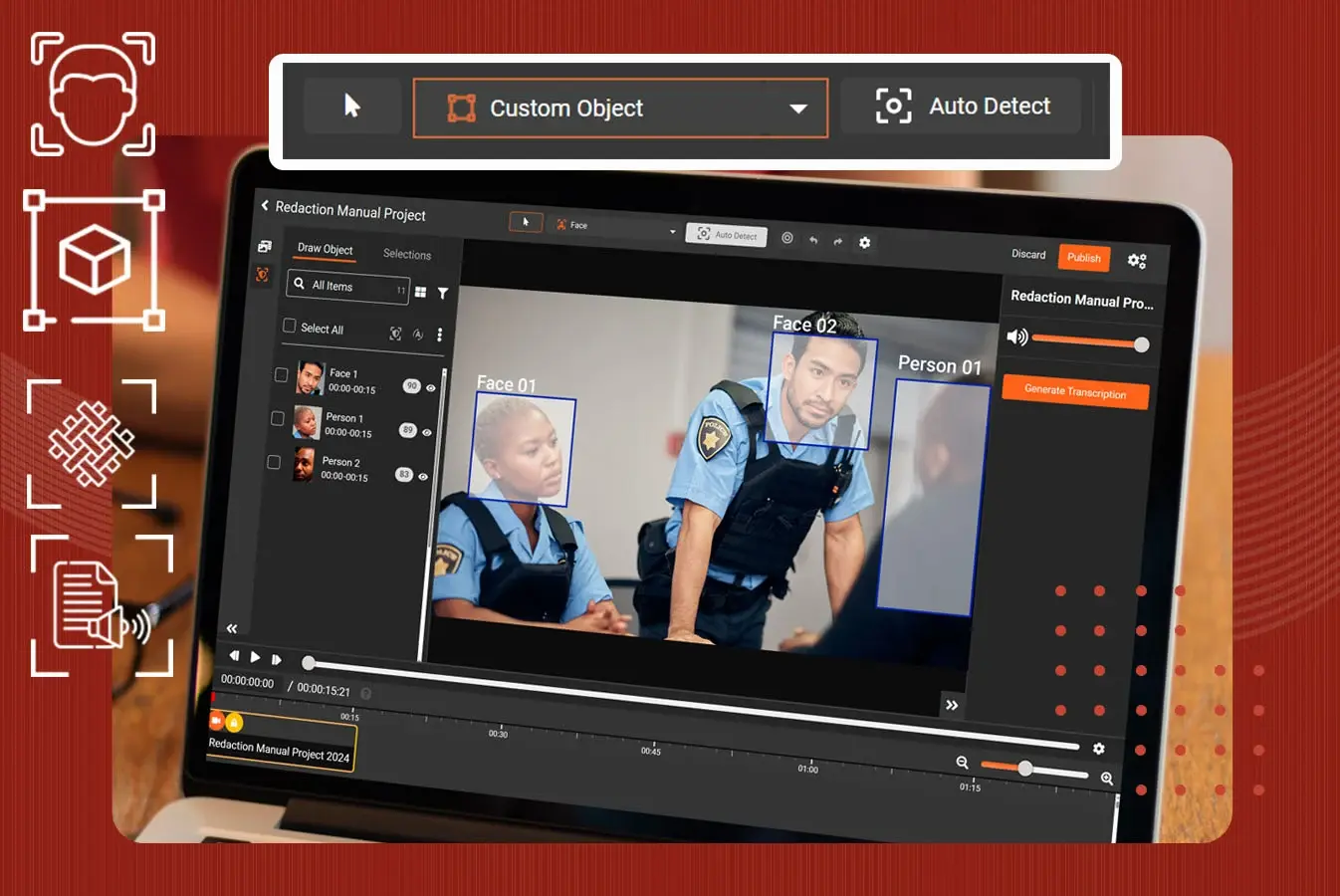Redaction is a core necessity for the management and sharing of present-day digital evidence files. The process allows us to conceal confidential and private information, such as PII (Personally Identifiable Information), from public view. With several tools existing in the market for this purpose, we have come down to two types of redaction processes – manual and automatic.
Today, we’ll be exploring manual and automatic redaction in this blog. Each carries its own advantages and disadvantages and analyzing them will lead us to our conclusion – a universal redaction solution.
Manual Redaction – Accuracy but at a Huge Cost
Manual redaction is performed by the user placing a layer over a video, in which using bounding boxes, the user redacts elements present within by blurring, pixelating, or filling them with an opaque color. Considering that the human mind is judging each element for redaction, the results provided are highly accurate.
However, the process is excessively time-consuming and is not applicable for enormous amounts of video content.
Automatic Redaction – Not Human but Not Too Far Behind
Automatic redaction makes the entire task easier through the assistance of AI (Artificial Intelligence). The AI detects all faces, objects, PII information and other elements present in a video, which can later be redacted with ease.
While this may sound efficient, there are a few obstacles in the way. For one, AI is not very accurate when working with lower video qualities, and often assumes objects to be duplicated or mislabels them. It may consider some region of a frame to be a face, where there may be no trace of any facial features at all. The AI may also lack in terms of tracking a moving object, that is to be redacted, throughout the video.
We must understand that in real-world scenarios, most of the videos ingested from sources such as CCTVs, mobile phones and body cams, are not in high definition 1080p or some other pristine quality. Hence the AI may not work at its full potential working with such videos.
It's All About Data!

Source: “How much data is generated each day?” by Jeff Desjardins, World Economic Forum
The choice of choosing between automatic or manual redaction comes down to one important contributing factor – data. Now that we are working with heaps of digital data, doing a manual redaction sounds impossible. A lot of workforces would be needed to go and, for every video file available, redact out elements present in each frame of each video.
However, when it comes to automatic redaction, accuracy is a concern. Based on the parameters presented, the AI used can hardly ever be as accurate as a human being. For an entire bunch of videos ingested, after automatic redaction, a user would have to skim through each video to check if the redaction is done correctly.
So, what’s our way out of this mess?
Why Not Use a Combination of Both?
We’ve seen that both manual and automatic transcription carry their own set of shortcomings. But the interesting thing to note is that the flaws of one are overcome by the other. So, how about we use a combination of the two?
Artificial Intelligence could implement computer vision technologies, such as facial detection, to speed up the process. Later, corrections can be made to the detections made by AI manually, and the final detection results can be redacted.
Does The Market Offer Such Tools?
There are countless tools offering redaction for video and audio content, readily available for use.
However, most of these tools do not provide you with the functionality of performing redaction automatically and manually as well. Often these tools provide only one mode of redaction. Amongst the select few that do provide both, some of them do not allow the user to execute both types of redactions in a single iteration.
Fortunately for you, we have something that fits perfectly in this case.
Meet VIDIZMO’s Redaction Tool – The Ultimate Solution to Your Video Redaction Needs

Recognized in the “IDC MarketScape: Worldwide Digital Evidence Management Solutions for Law Enforcement 2020 Vendor Assessment" report, VIDIZMO is known as a major player in the domain of digital evidence management systems.
VIDIZMO has its own proprietary Redaction Tool that allows for both automatic and manual redaction. Its AI is trained to detect faces, people, objects, and license plates. These elements can be automatically redacted at a single click of a button through the easy-to-use interface, followed by manual redaction allowing one to meet up for any shortcomings of the AI.
However, VIDIZMO’s Redaction Tool is simply not limited to that. Here are a few other key features of the redaction tool:
- Video evidence uploaded for redaction is crucial data. VIDIZMO ensures that these videos remain secure at transit and at rest. AES-256 encryption and several other protocols and measures are incorporated for the security of each file throughout the system.
- The browser-based application works on an easy-to-use interface with everything that you need in one place.
- VIDIZMO’s redaction tool not only detects faces and other elements automatically but also actively tracks them throughout the video.
- Streamline your redaction to expedite investigations by redacting vehicles, license plates, weapons including pistols and rifles, and other custom objects present in videos and images.
- The redaction tool gives the option to blur, pixelate or cover an object in the bounding box with a solid box of opaque color.
- Each detected element can be given a unique name, which in turn acts as metadata for enhanced search and more!
- VIDIZMO Redaction is available as a SaaS product, can be deployed in your commercial or government cloud, or implemented into your on-premises datacenter.
- After redaction has been performed on a file, the tool gives the user an option to save it as a new file or overwrite the original file.
- If you wish to embed our redaction tool into your existing RMS or CMS systems, then we have VIDIZMO Redaction tool’s API and widgets for you!
- VIDIZMO’s Redaction tool is FedRAMP compliant through our partnerships.
- The tool allows you to efficiently process and redact multiple files simultaneously.
- Unlike several other existing tools in the market, VIDIZMO’s Redaction Tool is available as an integrated add-on in our complete DEMS (Digital Evidence Management System) solution. The tool is also available as a standalone product and can be added to our EVCM (EnterpriseTube Video Content Management) solution as well.
If you wish to learn more about our online redaction tool, be sure to check out the video redaction tool page or contact us.
Manual and automatic redaction is just one part of a broader topic. We recommend checking out our detailed guide on redaction to understand more.
Posted by Muhammad Nabeel Ali
Nabeel is an Associate Product Marketing Manager at VIDIZMO and an expert in evidence management technologies. He is actively researching on innovative trends in this domain such as Artificial Intelligence. For any queries, feel free to reach out to websales@vidizmo.com





